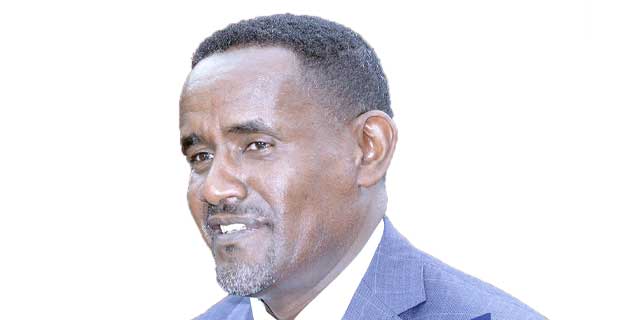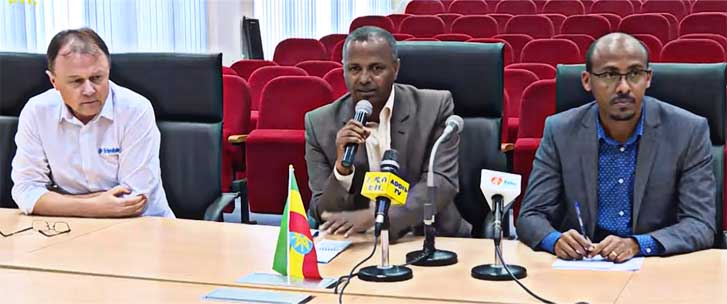
Fortune News | Feb 08,2020
All public transport associations and service providers will need to reestablish under commercial entities if they are to continue in the public transport business. A new draft directive signed off by the previous Minister of Transport & Logistics, Damgmawit Moges aims to reform public road transport setting qualification standards.
Officials claim it is part of a series of reformations introduced by the Ministry this year to treat transport associations and service providers as commercial entities delineating the powers of the Ministry and its ambitions.
It stipulates that service providers will need to put colour-palleted stickers on the back of their vehicles reflecting the class of services they are authorised to perform, from special operators to level three service providers. These stickers will reflect the class of services permitted by the Ministry with minimum standards set on the type and number of vehicles a company is required to have.
Special public transport operators will be allowed to cross international borders without restrictions on maximum distance. A white sticker is issued to entail vehicles that are less than seven years old. Sole proprietors need a single vehicle with a GPS tracker and 45 passenger seats while share companies and private limited companies will need five and 10 cars respectively.
Level three service providers will be confined to a 300km radius on international roads. The required number of minimum vehicles increases with rising levels reaching 50 for level three operators organized under share companies, with a concomitant waning in the permitted number of services.
All levels are prohibited from charging fees for luggage that weigh less than 25kgs, for children under the age of seven while also expected to begin provision of services at 3:30 AM.
The implementation of the directive pertaining to the freight truck associations suffered backlash when it was announced in late 2022 within a few months of the proclamation.
Mustafa Jemal, head of public transport management at the Ministry conceded that the time gap between the ratification of a proclamation and the issuance of a directive could serve as a source of "misunderstanding". However, he believes the new draft came into existence with a lot more tact.
"50 associations were consulted within three days of drafting the document," Mustafa told Fortune.
He also indicated that certain stipulations within the draft were in lieu of the Tripartite Transport & Transit Facilitation Programme (TTTFP) to which Ethiopia is a signatory.
TTTFP entails the integration of transport systems between the Southern African Development Community (SADC), Common Market for Eastern & South Africa (COMESA), and East African Community (EAC) countries aimed at facilitating smooth cross-boundary travel between the 26 countries.
As a part of this effort, the World Bank financed the TRANSIP project in Ethiopia with 300 million dollars six years ago while the project headed by Bahru Mossa is currently working to upgrade driving licenses through digitisation and biometric data.
The European transportation infrastructure should be taken as a model in any attempt to integrate transport mechanisms between African countries suggests Birhanu Zeleke (PhD). The Transport Management Lecturer at Kotebe Metropolitan University was surprised to learn that the associations were still not organized as commercial entities.
He emphasised the importance of reorienting priorities in transportation to trains and railway systems.
"Expecting road transport to solve public demand is far-fetched," says Birhanu.
Efforts to recreate transport associations as commercial entities were attempted back in 2021 through a directive by the Ministry only to be dropped by a federal high court judge. Things are different this time around as the legal framework to bolster the new series of drafts have already passed through the legislative gears and was signed off by President Sahlework Zewde in June of last year.
President of the Ethiopian Transport Employers’ Federation, Birhane Zeru believes despite the benefits of reestablishing transport associations as commercial entities the execution has been rushed.
He reasoned that the proclamation had already set a deadline for a year despite economic impasses arising from the war as most large transport vehicles were commandeered for military purposes.
"We had not worked for two years due to the war," he said.
Birhane who heads the 9000-member strong federation suggests credit provision or tax exemption mechanisms to smoothen the transition while he acknowledged that this draft involving public transports got slightly more engagement from the Ministry.
"There's still significant resistance to constructive input," he told Fortune.
PUBLISHED ON
Feb 25,2023 [ VOL
23 , NO
1191]

Fortune News | Feb 08,2020

Fortune News | May 02,2020

Radar | Dec 19,2021

Fortune News | Aug 03,2019

Radar | Aug 03,2025

Dec 22 , 2024 . By TIZITA SHEWAFERAW
Charged with transforming colossal state-owned enterprises into modern and competitiv...

Aug 18 , 2024 . By AKSAH ITALO
Although predictable Yonas Zerihun's job in the ride-hailing service is not immune to...

Jul 28 , 2024 . By TIZITA SHEWAFERAW
Unhabitual, perhaps too many, Samuel Gebreyohannes, 38, used to occasionally enjoy a couple of beers at breakfast. However, he recently swit...

Jul 13 , 2024 . By AKSAH ITALO
Investors who rely on tractors, trucks, and field vehicles for commuting, transporting commodities, and f...

Oct 25 , 2025
The regulatory machinery is on overdrive. In only two years, no fewer than 35 new pro...

Oct 18 , 2025
The political establishment, notably the ruling party and its top brass, has become p...

Oct 11 , 2025
Ladislas Farago, a roving Associated Press (AP) correspondent, arrived in Ethiopia in...

Oct 4 , 2025
Eyob Tekalegn (PhD) had been in the Governor's chair for only weeks when, on Septembe...